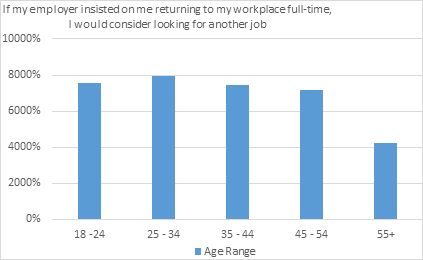Mumbai, June 2022 – Younger workers are more reluctant than their older colleagues to return to the workplace full-time as employers seek to encourage staff back into the office, the ADP® Research Institute’s People at Work 2022: A Global Workforce View reveals.
According to the survey of almost 33,000 workers in 17 countries, more than seven in 10 (71%) of 18-24 year olds and two thirds (66%) of 25-34 year olds would consider looking for another job if their employer insisted on a full-time return to the workplace, compared to 56% of the 45-54 age bracket.
Overall, two thirds of the global workforce (64%) have already, or would consider, looking for another job if their employer stipulated that they must come in to work on the premises every day.
In India, 76.38% of workers would contemplate quitting if this happened. The report explores employees’ attitudes towards the current world of work and what they expect and hope for from the workplace of the future.
25 – 34 cohort likely to prefer working remotely (India based)
Rahul Goyal, MD, ADP India, comments: “Lockdowns have been eased and raising the question of whether workers can be asked or compelled to return to work. For many, this could be a deciding factor in their decision to leave.
These findings contradict some people’s beliefs that younger people are desperate to return to the workforce for social and career advancement reasons.
Before employers make any firm decisions, it is worth investigating whether this reluctance is due to health concerns or other causes, in order to alleviate any concerns and find a way forward that suits both the business and the employees.”
In India, it also appears that 75% of workers feel that they have continued to collaborate with their teams perfectly while working remotely, thus a lot of them are reluctant to return to the office full-time.
Rahul further adds, “It is important for young people to be surrounded by peers and superiors to learn and gain experience and create networks early on in their careers and they need to find new ways to encourage them back to an in-person environment, engage them once there and help rebuild lost confidence and skills.”
For example, having accessible human capital management data to create visibility around individuals and teams could help to inform decision-making, build a more connected internal culture and enhance trust and loyalty between employers and staff.
